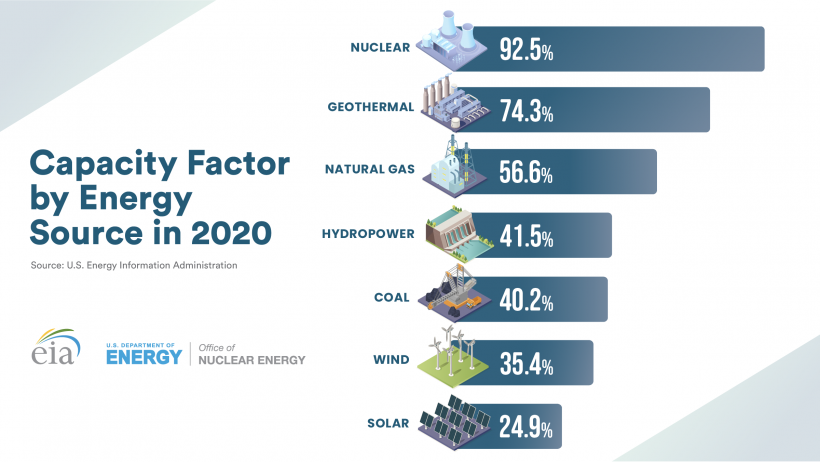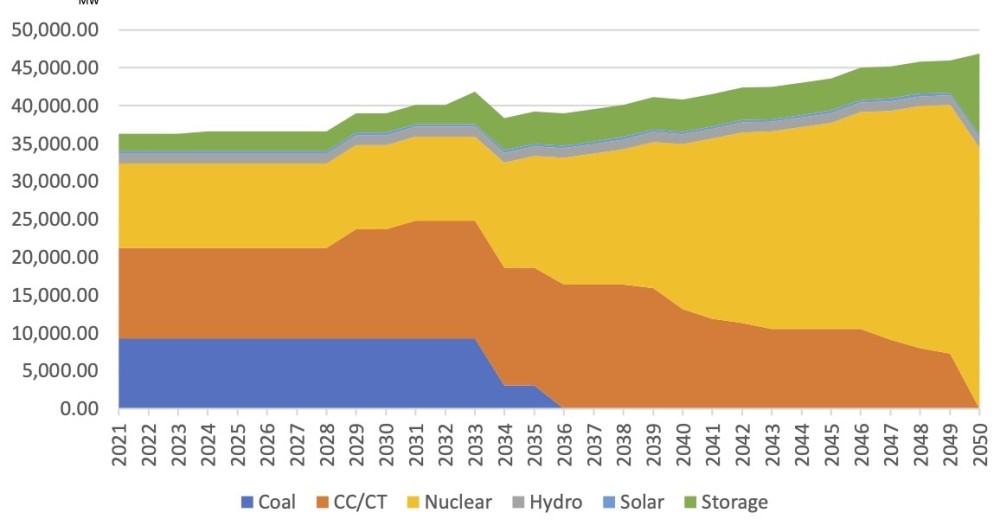Publisher's Note: This post appears here courtesy of the
John Locke Foundation. The author of this post is
Jon Sanders.
- Gov. Cooper vetoed bills that would define nuclear energy as clean energy and help a new natural gas pipeline get permitting
- Cooper and certain environmentalists seem to think the vetoes would result in lots more solar and wind, but because of state law requiring the path to carbon-neutral electricity generation by 2050 to be least-cost and to maintain or improve grid reliability, their effect could actually end up delaying coal plant retirements
- Passing SB 678 and HB 600 over the governor's vetoes would uphold reliable electricity provision and protect North Carolina ratepayers
On Monday, October 2, Gov. Roy Cooper vetoed Senate Bill 678, which would have North Carolina law recognize the obvious: that nuclear energy is clean energy.
Cooper apparently issued his veto on the last possible day to do so because he had, rather inconveniently, declared the week prior to be
"Clean Energy Week." The bill would change statutory language in North Carolina law from
"renewable energy" to
"clean energy" and add to the list of clean energy resources
"nuclear energy resources, including an uprate to a nuclear energy facility" as well as (nuclear)
"fusion energy" to the definition of
"clean energy resource."
It's a change I have advocated since 2013, noting then that
"nuclear, which emits no carbon dioxide, sulfur dioxide, or nitrogen oxides, is expressly listed as an unapproved source" - citing the Obama administration's Environmental Protection Agency's
"Clean Energy" entry on nuclear - was somehow
"expressly listed as an unapproved source" for clean energy under North Carolina law.
The
"problem": highly efficient nuclear puts other clean energy sources to shame
Not only is nuclear an obviously clean energy resource, it is also the most efficient energy source, and as such, it addresses the wants and needs of people across the political spectrum.
Nevertheless, nuclear power opens a deep and longstanding rift among environmentalists. For some environmentalists, nuclear's efficiency and lack of greenhouse gas emissions make it the answer to their vexing problem. For others, however, those very aspects are the problem - because they put their pet resources, solar and wind, to shame. As the title of a 2019 Forbes article explained it,
"The Real Reason They Hate Nuclear Is Because It Means We Don't Need Renewables."
Zero-Emissions Nuclear Is the Most Efficient Energy Source By Far

This animus is behind Cooper's veto. He tried twice to suggest that adding nuclear power would not be cost-effective in achieving the goal of recent state law to charting path to
"carbon neutral" electricity generation by 2050 that is least-cost and maintains or improves grid reliability. But in reality, those least-cost and reliable guardrails make it extremely important for the North Carolina Utilities Commission (NCUC) to approve new nuclear generation, as Locke's Center for Food, Power, and Life argued in analysis presented before the NCUC in 2022. Our proposed model
"Least Cost Decarbonization" scenario would use natural gas as the
"bridge" resource to ultimately relying primarily on nuclear and storage by 2050.
Model Least Cost Decarbonization Portfolio: Total Installed Capacity by Year

Nuclear's importance was further illustrated in August, when Duke Energy filed with the NCUC an updated resource plan with three possible portfolios, all three expanding nuclear. Duke's preferred portfolio - which would also be the least-cost one - would also add the most natural gas-fired generation but no offshore wind by 2038 because natural gas is widely acknowledged to be the least-cost, reliable
"bridge" resource between baseload coal and baseload zero-emissions nuclear. So despite what Cooper said, the least-cost path includes more natural gas and nuclear, not less.
The last bit of Cooper's veto gave the game away:
"North Carolina should consider all pathways to decarbonize, rather than putting a thumb on the scale in favor of building new conventional generation."
In the real world, all means all. In the world of politics, meanwhile, defining a clean fuel as a clean fuel is
"putting a thumb on the scale" in its favor.
Trying to burn a
"bridge"
Cooper issued another veto that same day and from that same animus. As an article placed in the News & Observer by the Hartfield Foundation and 1Earth Fund explained, Cooper vetoed House Bill 600, the Regulatory Reform Act of 2023, in part because the bill
"includes provisions that would help MVP Southgate attain water quality certifications that N.C. Department of Environmental Quality regulators previously denied." A key reason for the permit denial had been rendered moot, however, when Congress passed permitting approvals for the Mountain Valley Pipeline (MVP) earlier this year and the MVP then asked Federal Energy Regulatory Commission for an extension to complete the Southgate route into North Carolina.
Still, it seems that
"[t]he Sierra Club focused on provisions intended to boost MVP Southgate's efforts to obtain water quality certifications for the pipeline's 73-mile route through Rockingham and Alamance counties." After the veto, the Sierra Club's North Carolina chapter director is quoted thanking the governor.
The importance of MVP Southgate is that it would give North Carolina access to a second pipeline. The state's only pipeline, Transco, is already fully subscribed. Without new supplies, new natural gas plants could not be built to cover the gap between coal power retirements and new nuclear buildouts (which take time to complete). Recall that Duke's preferred, lowest-cost portfolio adds the most natural gas power, which the new supplies make more feasible.
The MVP Southgate pipeline extension would bring important supplies of natural gas into North Carolina, because the state's only pipeline, Transco, is fully subscribed

While Cooper and certain environmentalists seem to think that blocking access to more natural gas supplies would mean lots more solar and wind and then carbon-neutral Shangri-La, the practical reality of keeping costs low and maintaining or improving grid reliability means it would, if anything, delay the closings of coal power plants. As Duke explained in its latest resource plan,
"Delays in the completion of equally reliable replacement resources will cause [Duke] to revise the coal unit retirement schedules as needed to ensure reliability."
In other words, if Duke doesn't have
"equally reliable" generation resources to replace baseload coal, then it would have to keep coal plants operating. It would be the only way that Duke could ensure it could keep the power on. Solar and wind are intermittent, weather-dependent resources. They are incapable of being equally reliable to coal. Natural gas can be, however, and so can nuclear.
Why overriding Cooper's vetoes would help North Carolina ratepayers and the cause of lowering emissions
Cooper's vetoes aim to discourage new nuclear plants and also signal that his administration plans to block new natural gas supplies by playing games with permitting. If they stood, they would lead to much higher electricity costs, greater unreliability in electricity provision, a worse risk of blackouts, and even higher carbon dioxide emissions from electricity generation than otherwise.
The governor's actions also demonstrate the wisdom of the General Assembly in putting those least-cost and reliable guardrails in state law. Legislators have been proven right to suspect Cooper would try to play favorites to the detriment of electricity consumers.
Passing SB 678 and HB 600 over the governor's vetoes would uphold reliable electricity provision in North Carolina and protect North Carolina ratepayers.



